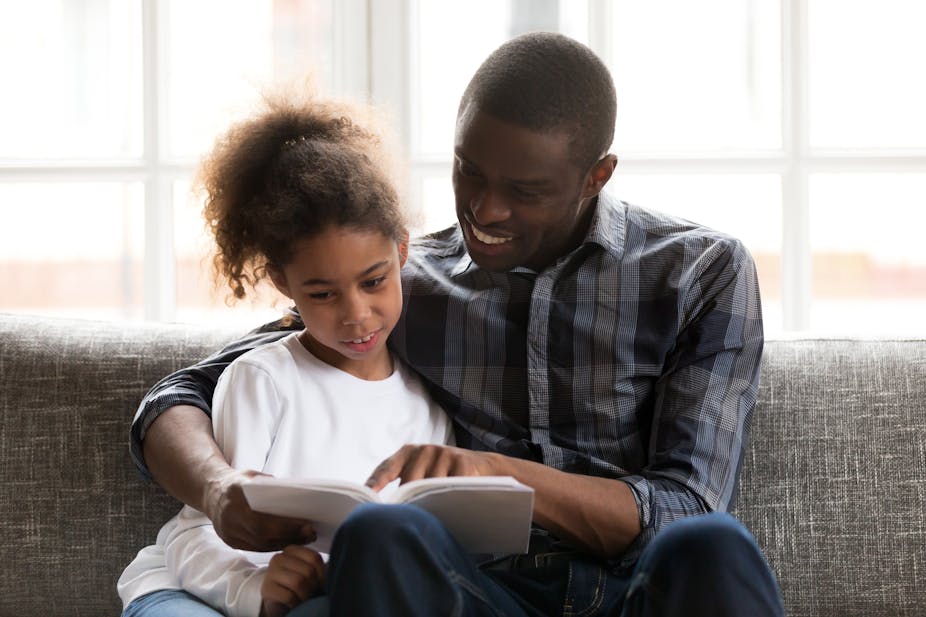Reading at home is important. Evidence of the effects of reading and a general culture of reading on adolescents in over 30 countries has shown that reading is good for personal development, intellectual growth, literacy and even numeracy.
A culture of reading is more likely to open doors to grow in society. Research from 2019 showed that, the mere presence of 80 books or more at home is likely to predict better social growth and development for a young child. This is because having books at home suggests a culture and role-modelling of reading by parents, which in turn suggests that the child is exposed to articulate, informed expressions of ideas by the whole family. In other words, a culture of reading at home is something that can give children references, codes and patterns of fluency that are socially empowering.
It is particularly good for children to see their parents reading and for parents to read to their children. Bedtime stories or afternoon reading time are excellent ways of improving cognition, vocabulary and grammatical structure. Discussing reading as a family is also a positive bonding activity.
It can be difficult to find the time to read since the world we are living in is so fast-moving and there are many sources of information around us, distracting our attention. It takes an effort to pull out a book and read it, but it’s worth it.
My area of specialisation is education and there is no shortage of literature on the subject. However, much of it is specialised and will not appeal to non-educators or the general public: books on theories of cognition, social psychology, assessment and curriculum design. I prefer to take a wide view on education when it comes to recommending books that parents might wish to read or even read directly to or with their children – in the cases of the books I am going to list, from about 14 years old up.
Which books to read?
In the 21st century, being an educated person means being a global citizen: someone who knows at least a little about cultures, stories and histories other than one’s own. There are powerful narratives that should be read and shared. Here are four I have chosen, perhaps to read over the holiday break:
Long Walk to Freedom by Nelson Mandela
This is a soaring masterpiece that takes us through the history of South Africa, the inhumane apartheid system, but also core African ideas and social structures. Nelson Mandela’s story speaks to all of us for it is about resilience, humanity and the victory of light over darkness. I would recommend this as essential reading to know about Southern African history, leadership and moral justice.
The Meditations by Marcus Aurelius
This is a book I have my 15-year-old philosophy students read, but in truth, anyone can read it from about 14 years of age. It is a congregation of aphorisms about how to live one’s life and contains extensive references to Greek and Roman history and philosophy. What transcends the book is an extraordinarily beautiful prose that takes us to the heart of universal psychological themes such as fear, happiness, accepting impermanence and seeking inner peace. The Roman emperor’s text is a bed-side book on education for life.
Dear Ijeawele, or A Feminist Manifesto in Fifteen Suggestions by Chimamanda Ngozi Adichie
A short, concise and compelling read, this book is about empowering girls and educating with feminist principles in mind. It can be read by any parent, not only those with female children. Following her famous TedTalk We Should All Be Feminists, the author drives home some of the messages we can send our children to prevent them from growing up in the shadow of gender stereotypes and sexism. Many of the seemingly innocuous, hetero-normative associations we make and subliminal messages we send to children are, in reality, skewed against women and girls. This book can be read and discussed as a family.
This gem of spiritual wisdom, thousands of years old, is a powerful gateway into Eastern thought. The German philosopher Arthur Schopenhauer, who kept a copy with him at all times, said that the Upanishads were his consolation in life and would equally be his consolation in death. The text describes the Hindu and Buddhist concepts of the self, the soul and pure spirit. The Upanishads can be read as aphorisms, in short sequences, and would be a good way to start each day: a few lines or pages bring the mind back to the essentials and allow us to put things into a larger perspective.
Whether parents read bedtime stories to their children, gather around as a family to read extracts from a text, stretch out on the sofa to enjoy a work of fiction just for the pleasure or create silent reading time at home, the essential is that there is reading, that we put aside some precious time to be away from screens and to enjoy the power of the text and the mind-improving benefits that this brings.
To me, educating our children in the 21st century is about teaching them to appreciate the human condition in all its diversity and multiplicity. Holiday reading can contribute to this.

